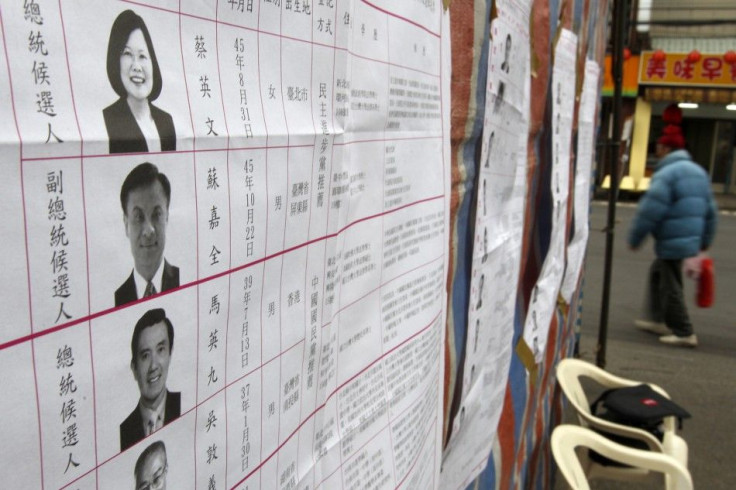Taiwan Goes to the Polls, with the Eyes of China and U.S. upon It

Taiwanese voted on Saturday for their next president and parliament, an election being closely monitored by China and the United States as they look for stability in the region at a time of political transition for both superpowers.
Opinion polls suggest the presidential race will be tight. But a slight advantage is seen for incumbent Nationalist Ma Ying-jeou, 61, who has fostered warmer ties with China, over Tsai Ing-wen of the opposition Democratic Progressive Party (DPP).
Voters queued up in orderly lines in Taipei and other cities islandwide after polls opened at 8 a.m. (0000 GMT). The sky was overcast in the capital but it was relatively balmy, underlining hopes for a high turnout.
I feel calm and hopeful, said Hwang Shiu-mei, a mother of three who was in line to vote at a booth in a Taipei market.
I hope we can see a win-win situation with China in the coming four years. We don't want to see a stalemate and hope for a better economy, along with peace and stabilility.
Both main contestants were confident as they cast their vote early.
I see a little sunshine now, Ma told reporters at his polling station in a Taipei church after a slight drizzle eased.
I'm very happy, I urge everyone to come out early and vote. This weather should help the voting rate.
Asked if he had a restful night, Ma replied: I sleep well every night.
Opposition leader Tsai, casting her ballot at a school in a Taipei suburb, said she was mentally prepared to become the first female president of Taiwan.
I hope we will be able to give you a full explanation after the vote is counted, she said, when pressed for details.
Smooth Vote
The run-up to the election has been smooth. Unlike in 1996, when China fired missiles into waters off Taiwan before the island's first direct presidential election, Beijing has learnt to temper any response to avoid antagonizing voters into backing the DPP.
The DPP's independence-leaning stance has long angered Beijing, which deems Taiwan a renegade province and considers U.S. arms sales to the self-ruled island as the top obstacle to improved ties between the United States and China, now the world's two biggest economies.
Tsai has distanced the DPP from the independence stance. But a DPP victory could complicate matters for Chinese President Hu Jintao and other leaders who will hand power to a younger generation later this year and who don't want to jeopardize their legacy of fostering more stable cross-strait ties.
The United States, which holds presidential elections later this year, will also be keen to take a potential irritant in bilateral ties with China off the table.
In Taiwan, besides the presidential election, the 18 million eligible voters will also choose the island's 113-member parliament, currently dominated by the Nationalists, that will be crucial in expediting or stalling future policies.
Most analysts expect a high turnout given the closeness of the race. Nearly 200,000 Taiwanese have returned from overseas for the poll according to local media reports, cramming flights in a last minute rush to cast ballots.
Ma and Tsai, both former law academics with doctorates from Harvard and the London School of Economics respectively, held a flurry of rallies and motorcades islandwide on Friday, the final day of campaigning, with Ma focusing on the DPP's largely rural stronghold of the south and Tsai aiming north.
A third candidate, former Nationalist party member James Soong who now leads a splinter party, trails far behind in the polls but could cloud the result for the Nationalists by siphoning off some of Ma's support.
Some see the election as a referendum on the economic rapprochement with China shepherded by Ma over the last four years, that may have eased decades of animosity and the threat of outright war but raised fears of an over-reliance on its powerful neighbor.
However on the streets, livelihood issues dominate, especially at a time of global economic uncertainty for export-reliant Taiwan.
We hope the new president can improve the economy, said Hsu Kuo-hsiung, a 49-year-old car mechanic as he polished a black sedan in his garage in a Taipei suburb.
This is most important. If there's no stability, the economy will suffer.
(Editing by Raju Gopalakrishnan)
© Copyright Thomson Reuters 2024. All rights reserved.












